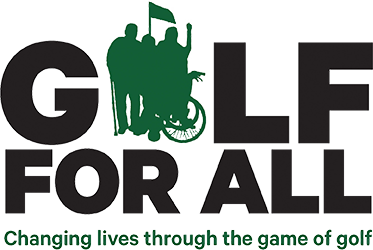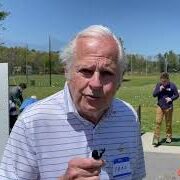Jim McCabe | May 24, 2023, Power Fades
There are those most beautiful times in golf when to sit and watch golfers hitting off well-worn mats at a municipal practice range doesn’t require a keen eye or data-gathering equipment.
What you need is a warm heart, layers of humility, and deep appreciation for the wonders of this game and how it spreads its magic to so many corners.
Like a young man named Danny who was in rapid-fire mode, hitting golf ball after golf ball after golf ball at such a brisk pace that you couldn’t take your eyes off him. “He might hit half that bucket in a few minutes,” laughed Fred Corcoran.
Some of Danny’s shots dribbled off the tee, others sprayed wide right, but when solid contact was made – and it happened quite a few times – the smile was real, the exclamation loud and emphatic, and the fist pump . . . well, it gave substance to Corcoran’s world.
“When people ask why we do this, I tell them it gives me a profound sense of gratitude,” he said.

The joy is delivered in buckets by heroes like Danny and his friends who were with him Monday night at Ponkapoag Golf Course in Canton, Mass. A dozen or so young adults were there to hit golf balls for more than an hour thanks to a non-profit organization called “Golf For All.” Corcoran is a co-founder along with Jerry Donovan and Bob Beach, a prince of a man who is unmatched in the golf universe when it comes to giving of himself.
Beach (who was a “Power Fades” subject in 2021 https://bit.ly/3WChbd2 ) has answered calls for more nearly 30 years to help golfers enjoy the game despite whatever obstacle it is that must be dealt with. Autism, loss of limb, recovering from a stroke, paraplegic. Beach looks past them all and sees only an eager soul and appreciative smile.
So imagine his pleasure that governing bodies across the globe have focused energies on organizing adaptive golf championships. Beautiful, that, but Beach is equally thrilled that on the local landscape others have arrived to accommodate veterans’ groups, shuttle buses carrying children from facilities such as the Cardinal Cushing Centers, and the buoyant presence of Massachusetts Special Olympics.
Ignoring the chill in the air on a Monday evening at Ponkapoag, Beach was present to help young adults with special needs and he offered praise for Corcoran.
“Fred has stepped up his game in my opinion,” said Beach. “Fred is doing more in the field and we help several programs even when there is no funding.”
Now mixing this Corcoran gentleman into the golf scene somehow feels quite natural, given his roots, so he was asked if his late, great uncle might be smiling down with all this “Golf For All” philanthropy.
“I’d like to think so,” he said. “My uncle was a lot of things in golf, but he believed in giving back.”
It would require exhaustive coverage to accurately report all of Fred Corcoran’s achievements in the world of golf but if you digest the fact that he’s in the World Golf Hall of Fame, that gives you a pretty good clue.
Born in Cambridge in 1905, Fred was one of five Corcoran brothers. Not much is known about the oldest, Frank, or one in the middle, George. “But my dad (Joe) and his brothers Fred and Billy were all about golf,” said Fred, who is named after his late uncle.
Fred Corcoran was widely known as “Mr. Golf” and for good reason. In the 1930s and ‘40s he managed and promoted the PGA Tour, then he did similarly with the LPGA when 13 headstrong and committed women boldly said they wanted to tour the country playing golf.
Along the way, Fred Corcoran created the Canada Cup (now the World Cup of Golf), the Golf Writers Association of America, the Met Golf Writers, and served as official scorer for the US Open.
Oh, and being a Boston guy, he was at the forefront of the Mass Golf Association. At the age of 22, he became Executive Secretary and held that job till 1937 when he went to the PGA Tour. It stayed in the family, however, because first John and the Billy succeeded him in that same capacity. From 1927 to 1969 a Corcoran was at the head of the Mass Golf Association.
“They used to joke that pay was so low (in the post-Depression era) that nepotism is all they could afford,” laughed Fred, who might have inherited more than a love of golf from his Uncle Fred.
“I used to call him a seanchaí, the Gaelic word for storyteller,” the late Bud Harvey once said of Fred Corcoran, with whom he worked at the LPGA.
Offer him a chance to reminisce about golf, Fred the nephew can spin some great stories himself.
The day at Charles River when his father, Joe Corcoran, played alongside Francis Ouimet, Ted Bishop (the 1946 U.S. Amateur champion) and a giant of a golfer from the host course, Charles River CC, named Davey Sullivan? Young Fred Corcoran was a caddie and “let me tell you, that was rarefied air,” he said.
For so long, it was that way and Fred Corcoran feels blessed to have grown up in family that had access to golf at clubs such as Charles River and Oyster Harbors, Essex County Club and Winged Foot (where his uncle Fred lived). But Uncle Bill died in 1969, Uncle Fred in 1977, and Joe, his father, in 1981, and Fred Corcoran concedes that playing golf isn’t a high priority these days, given an assortment of aches and pains.
But golf as a mission? Now that is a high priority and the reason is simple.
“Meeting Bob Beach was a life-changing experience. It really was,” said Fred Corcoran, who started giving of his time to help military veterans enjoy the game and hopefully improve their lives.
But watching Beach move seamlessly from golfers with autism or Down Syndrome to those who have lost arms or legs or those who are confined to wheelchairs? It was awe-inspiring and Corcoran jumped at the chance to do more.
“It’s an emotional investment,” he said.
Corcoran resoundingly confirms that he was like most golfers for so many years – “we take more than we give, let’s best honest.”
But now the emphasis is on giving. As for a return on investment, he nodded his head. There is one.
“We get out of it a lot of smiles.”


